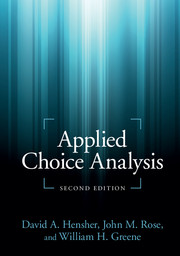Book contents
- Frontmatter
- Contents
- List of Figures
- List of Tables
- Preface
- Part I Getting started
- Part II Software and data
- Part III The suite of choice models
- 11 Getting started modeling: the workhorse – multinomial logit
- 12 Handling unlabeled discrete choice data
- 13 Getting more from your model
- 14 Nested logit estimation
- 15 Mixed logit estimation
- 16 Latent class models
- 17 Binary choice models
- 18 Ordered choices
- 19 Combining sources of data
- Part IV Advanced topics
- Select glossary
- References
- Index
16 - Latent class models
from Part III - The suite of choice models
Published online by Cambridge University Press: 05 June 2015
- Frontmatter
- Contents
- List of Figures
- List of Tables
- Preface
- Part I Getting started
- Part II Software and data
- Part III The suite of choice models
- 11 Getting started modeling: the workhorse – multinomial logit
- 12 Handling unlabeled discrete choice data
- 13 Getting more from your model
- 14 Nested logit estimation
- 15 Mixed logit estimation
- 16 Latent class models
- 17 Binary choice models
- 18 Ordered choices
- 19 Combining sources of data
- Part IV Advanced topics
- Select glossary
- References
- Index
Summary
Introduction
Although the multinomial logit model (MNL) has provided the foundation for the analysis of discrete choice modeling, its basic limitations, most notably its assumption of independence from irrelevant alternatives (IIA), have motivated researchers to consider alternative specifications. The mixed logit (ML) model (see Chapter 15) is probably the most significant among a number of innovations in terms of the range of behavior it can accommodate and its overall flexibility. The latent class model (LCM) presented in this chapter is in some respects a semi-parametric variant of the MNL model that resembles the ML model. It is somewhat less flexible than the ML model in that it approximates the underlying continuous distribution with a discrete one; however, it does not require the analyst to make specific assumptions about the distributions of parameters across individuals. Thus, each model has its limitations and virtues. However, as we will show below, the most advanced version of LCM permits continuous distributions in each discrete class for the class-specific parameters.
Latent class modeling provides an alternative approach to accommodating heterogeneity in models such as MNL and ML (see Everitt 1988 and Uebersax 1999). The natural approach assumes that parameter vectors, βi, are distributed among individuals with a discrete distribution, rather than the continuous distribution that lies behind the ML model. Thus, it is assumed that the population consists of a finite number, Q, of groups of individuals. The groups are heterogenous, with common parameters, βq, for the members of the group, but the groups themselves are different from one another. We assume that the classes are distinguished by the different parameter vectors, though the fundamental data generating process, the probability density for the interesting variable under study, is the same.
- Type
- Chapter
- Information
- Applied Choice Analysis , pp. 706 - 741Publisher: Cambridge University PressPrint publication year: 2015

